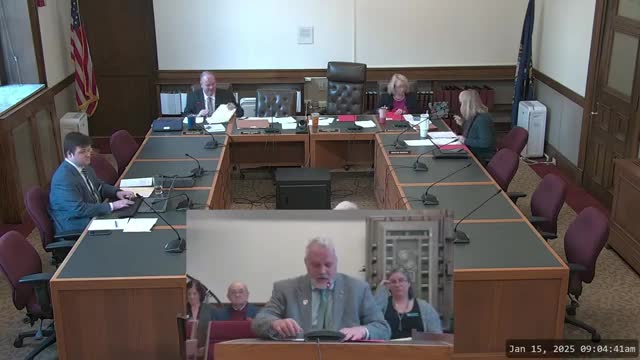Committee advances Fish and Game housekeeping bill to allow online notices, align state and federal waterfowl rules
Get AI-powered insights, summaries, and transcripts
Subscribe
Summary
The Senate Executive Departments and Administration Committee advanced Senate Bill 32, a housekeeping measure requested by the New Hampshire Fish and Game Department that would allow required public hearing notices to be published on newspaper websites and make technical changes to waterfowl and fisheries law.
The Senate Executive Departments and Administration Committee advanced Senate Bill 32, a housekeeping measure requested by the New Hampshire Fish and Game Department that would let public hearing notices required by statute be published on newspaper websites and make several technical changes to state wildlife and fisheries law.
The bill would: permit digital publication of the department’s biennial public hearing notices (as currently required in print); adopt federal practice allowing the taking of crippled waterfowl from powered watercraft to match 50 CFR 20.21; remove the word “brook” from certain references to trout so rules can apply to all trout species; allow the executive director to set fisheries habitat fees through administrative rules; and repeal the Connecticut River Atlantic Salmon Commission language and reflect that work under the Connecticut River Migratory Fish Restoration Cooperative.
Why it matters: Fish and Game staff told the committee that many notice publications are now online only, that federal regulations already authorize taking crippled waterfowl from powered craft, and that the trout-language change is to clarify management across species. The committee adopted a technical amendment to add a link requirement and wording changes to reflect gender-neutral language for the department director.
Senator Howard Pearl, the bill’s introducer, told the committee the Fish and Game Department requested the package as “housekeeping measures.” Dan Bergeron, chief of the wildlife division, and Diane Timmons, chief of the inland fisheries division, described the specific changes and why the department requested them. Bergeron said the federal rule at 50 CFR 20.21 allows taking crippled waterfowl from powered craft and the state change would remove a conflict. Timmons said removing “brook” from trout references clarifies management language and that fisheries habitat fees are intended to be handled the same way wildlife habitat fees are handled today.
Committee action and amendments: Senator Altschuler asked that when a notice is published on a newspaper’s website it be “linked on the Fish and Game website” so the public can find it; the department said it already posts notices and press releases to its website and social media and accepted the amendment. Fish and Game staff also requested two gender-neutral wording fixes (changing “his” to “their”) to reflect the department’s current executive director. The committee adopted those technical changes and voted the bill ought to pass as amended.
What it does not do: The bill is housekeeping and does not change substance beyond aligning state law with the federal waterfowl regulation, clarifying trout language, and adjusting administrative fee authority. Fish and Game staff said the department already posts notices to its site and emails interested parties; the bill would remove the statutory requirement to use a print-only notice and allow online-only publication with the added link-to-website language.
Looking ahead: The committee’s vote moves the bill to the next stage. If enacted, Fish and Game would use the existing web and email practices staff described, and the statute would reflect current federal and department practices.
